“Champions in Florence”
Bobby Charlton
By Ruben Lopes Pegna
Almost all the stars of world football have played at the stadium in Florence, the current Artemio Franchi, first called Comunale and before that Giovanni Berta. Some of these champions wore the Fiorentina shirt, others were Fiorentina’s opponents in the Italian league or in the Italian Cup, or in official or friendly matches at an international level. Still others have been in Florence with their respective national teams in matches against the Italian one. Some, then, performed at the stadium in Florence during the world championships of 1934 and 1990 and during the European championships of 1968, organized by Italy (no competition of the 1980 Europeans in Italy was, however, played at the Comunale). I was lucky enough to see several of these world football champions live, including Robert Charlton, for all Bobby Charlton, born in Ashington in England on 11 March 1937 and sadly now suffering from senile dementia.
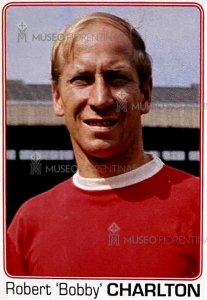
Bobby CHARLTON card (Museo Fiorentina Archive)
Bobby Charlton wins three national championships with Manchester United (1956/57, 1964/65 and 1966/67), a 1967/68 European Cup as captain (in the final in London with Benfica, won 4-1 in extra time, scored a brace), an English Cup in 1962/63 and four Charity Shields (the equivalent of the Italian Super Cup), in 1956, 1957, 1965 and 1967. He became world champion in 1966, when the England beat Germany 4-2 in extra time in Wembley final. In that year he won the Golden Ball.
With Manchester United from 1956/57 to 1972/73 he scored 249 goals, although he was not a pure striker. Leaving Manchester United after a sabbatical, he plays for Preston North End in England and then for Waterford United in Ireland. He closed his career in Australia in July 1979, playing in Melbourne, Bangor City, Newcastle Kb United and Blacktown City. Score a total of 18 more goals. Bobby Charlton is the classic attacking midfielder – a sort of “falso nueve” of today – who plays with both feet but is also skilled in aerial play.
He is also a kind of miracle. On 6 February 1958, on their return from Belgrade, where Manchester United drew 3-3 in the second leg of the European Cup quarter-finals with Red Star, after winning 2-1 in the first leg in England, qualification for the semifinals (will be eliminated by Milan) at Munich airport a serious plane crash occurs. Twenty-three people die, including eight Manchester United players. To them Bobby Charlton will dedicate ten years after his victory in the European Cup. In that team he is the only survivor of the veterans of the Munich disaster, together with the coach Matt Busby, Bobby Charlton plays twice at the Stadio Comunale in Florence. On Wednesday 12 October 1966 he played the friendly match between Fiorentina and Manchester United. On Wednesday 5 June 1968, however, the semi-final of the European championship is played between England and Yugoslavia. I only see Bobby Charlton live in this match. On the other hand, I read avidly the news of the match the next day in “La Gazzetta dello Sport” and “Il Corriere dello Sport”, which has not yet merged with “Stadio”. in 1976).
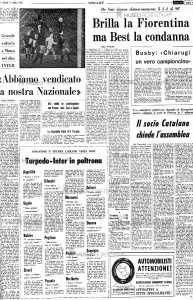
Il Corriere dello Sport 12-10-1966 (Museo Fiorentina Archive)
The game is played as part of the “British Week” initiatives which take place in Florence from 8 to 16 October 1966, a few days before the terrible flood of 4 November. I still remember, as if it were yesterday, many shop windows in the center of Florence decorated with flags of England and with various posters depicting London with its monuments but also with red telephone boxes, black taxis and men in bowler hats. England is fashionable then in Italy with the Beatles of course, but also with the world champion football team. As a twelve-year-old child, during the summer, I had seen the film “Fumo di Londra” with Alberto Sordi in an arena in Forte dei Marmi and, like many of my peers, I daydreamed about a trip to the City.
The match between Fiorentina and Manchester United scheduled for the night is one of the main events of the “British Week”. The Viola team arrives at the match fresh from a brilliant 6-2 victory obtained three days earlier in Venice thanks to the braces from Merlo and Hamrin and the goals from Brugnera and Bertini which served in part to sweeten the pill for the elimination that took place (October 5) in the round of 32 of the Fairs Cup, the current Europa League, by the Hungarians of Vasas Gyoer. At the Comunale Stadium, on a typically autumn evening in which it rains throughout the first half, there are about fifteen thousand spectators.
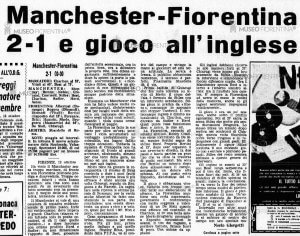
La Gazzetta dello Sport 13-10-1966 (Museo Fiorentina Archive)
For this match against Manchester United the viola coach Beppe Chiappella sends the following formation onto the field: Albertosi; Rogora, Diomedi; Bertini, Ferrante, Brizi; Hamrin, Merlo, Brugnera, De Sisti, Chiarugi. In the English team, led by Busby, the world champions Bobby Charlton and Nobby Stiles play among others, as well as the rising star, the Northern Irish winger (born in Belfast on 22 May 1946) George Best. Best, just twenty, is a winger with a great shot and capable of acrobatic dribbling. Various on the whole offensive front, creating many problems for the defenders who have to control it. He played for Manchester United from the beginning of his career until June 1974. He won two championships, in 1964/65 and 1966/67, an FA Cup in 1962/63, two Charity Shields in 1965 and 1967 and a Cup of the Champions in 1967/68 (scores a goal in the final). In 1968 he also won the Golden Ball. With Manchester United he scored 128 goals and scored 9 with the Northern Ireland national team. When he leaves Manchester United at the age of twenty-eight, he ends his career at a high level. He then plays with Stochport County, Cork Celtic, Los Angeles Aztecs, Fulham, Fl Strikers, Hibernian, San Jose Clash, Bournemouth, Brisbane Lyons and Tobermore where he closed his career in June 1985, after scoring another 69 goals.
When he plays in Florence Best is already a champion. He is not easy to control. But Diomedi in the first half and Vitali in the second do their best. In the Viola team, after a quarter of an hour, Bertini is injured and Esposito enters his place. The game gave emotions from the beginning and the purple goalkeeper Albertosi made some beautiful saves on conclusions from Bobby Charlton and Best. The latter, with the number seven shirt, also offers tightrope walking. And the balls are provided to him above all by Bobby Charlton, who plays close to the strikers.
Fiorentina, on the other hand, are not very precise and not very lucid in attack. However, the first forty-five minutes ended 0-0. In the second half Chiappella sent Boranga, Giampiero Vitali and Manservisi on the field respectively in place of Albertosi, Rogora and Brugnera. The Viola coach is also thinking about the championship match against Mantova scheduled at the Comunale of Florence four days later, on October 16 (it ends 0-0 and is the last match played in Florence before the flood). Busby, on the other hand, does not make any substitutions. The game lit up and Manchester United took the lead in the 8th minute with a goal from Bobby Charlton on an assist from Aston.
Fiorentina did not give up and at 16 ‘equalized thanks to a goal from a free-kick from full-back Vitali, granted for a foul on Chiarugi. Best, however, achieves the goal of the definitive 2-1 in the half hour, recovering a rebound by the goalkeeper Boranga after a conclusion by Sadler. Fiorentina moves forward and De Sisti, at the last minute, eats the 2-2 goal from a good position. Sin. For the Viola, the draw would have been a result of great prestige, against the team that in that season would have been crowned champions of England and in the following season, European champions.
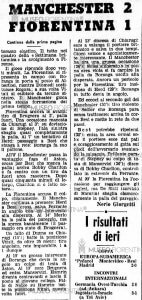
La Gazzetta dello Sport 13-10-1966 (Museo Fiorentina Archive)
The best players in the field are for Fiorentina De Sisti, who among other things also controls Bobby Charlton, Chiarugi, Brizi, Esposito and Merlo and for Manchester United Best, Bobby Charlton and Crerand. Matt Busby, at the end of the match, has words of praise for Fiorentina and for its young players. In particular, the English coach is impressed by Chiarugi. The purple team, also dragged by Chiarugi’s goals, won the Scudetto a little less than two and a half years later.
Manchester United plays another game in Florence. On 23 November 1999, on the first day of the second group stage of the Champions League, the English team, the reigning European champions and who after a few weeks also became world champions, were beaten by Fiorentina 2-0. For the viola, Gabriel Omar Batistuta scored in the first half and Abel Balbo in the second half.
Instead, I see live the match between England and Yugoslavia which takes place on Wednesday 5 June at 9.15 pm, among other things giving up watching on television the final part of the other semifinal, the one between Italy and the Soviet Union (which began at 18:00), because I am on the way to the stadium. I have already been in the Marathon for a few minutes, surrounded by many Yugoslavia fans, when with a liberating shout I welcome from the radio the news that the Italy of Ferruccio Valcareggi, former Fiorentina coach, has won the match with the team at the San Paolo stadium in Naples. Soviet Union (thanks to the coin thrown in the locker room in the presence of the two captains; the blue one is Facchetti) after the extra time ended 0-0, and therefore he is in the final.
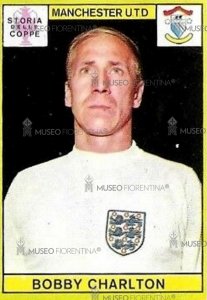 Bobby CHARLTON card (Museo Fiorentina Archive)
Bobby CHARLTON card (Museo Fiorentina Archive)
I am thrilled to see the world champions, big favorites of the match, and above all Bobby Charlton, the strongest player of the English national team, whose captain is the Libero of West Ham (the team against which Fiorentina won in 1975 the Italian-English League Cup) Bobby Moore (starring with Pele in 1981 in a famous film, “Escape to victory”). There is only one Manchester United player in that team.
It is Bobby Charlton (lined up with the number nine shirt) who has just won the European Cup. About thirty-five thousand people are present at the game.
I cheer for England, even if on the one hand I think Yugoslavia is more affordable for Italy in the final. However, I remain bad for the attitude of the fans, even the neutral ones who are the majority. I understand from the beginning which side people are on. A wrong pass by Charlton, on 2 ‘, is, in fact, greeted by the whistles of the public. Meanwhile, Bobby Charlton plays behind the two strikers Peters and Ball. Shortly after, Yugoslavia found themselves in ten as the midfielder Osim was seriously injured in the first minutes and at the time no substitutions were allowed.
The player moves to the wing as was customary in those times. At half time the English full-back Newton hits the crossbar. But that is a sporadic action. The monotonous and tough match comes on in the half hour thanks to a great shot from Bobby Charlton after an extraordinary action followed by another shot from Ball. In the second half, Yugoslavia, which even if it is not too dangerous, plays better, gets close to the advantage with a shot by Musemic. Emotions are scarce. Bobby Charlton, marked for man, touches a few balls. Yugoslavia proves to be a technical team, England, on the other hand, throws it on the physical strength of its players. Shortly after half an hour Bobby Charlton returns to the protagonist. Launched by Ball, he finds himself face to face with the goalkeeper Pantelic but ends with a great shot that ends out of a whisker. At 41 ‘, on the counterattack, on an assist from Musemic, the Yugoslav left winger Dzajic beats the English world champion goalkeeper Banks, scoring in the goal under the Railway curve. Shortly afterwards the white midfielder Mullery was sent off for a kick to the Yugoslavian Pavlovic. The game basically ends here with Yugoslavia going to the final.
I leave the stadium a little disappointed by the defeat of England, who have not been able to take advantage of the virtual numerical superiority for almost the entire match. In any case, the star of Bobby Charlton shone, the best of his. But it wasn’t enough. However, Bobby Charlton will score a goal in the final for third place, which England won 2-0 against the Soviet Union. Unfortunately, there is little room for football in the comments of the next day. In Los Angeles Bob Kennedy, the Democratic senator brother of US President John Fitzgerald assassinated in Dallas in 1963 and himself a presidential candidate, is killed after winning the electoral primary in California.
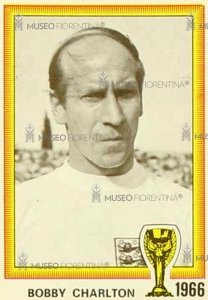
Bobby CHARLTON card (Museo Fiorentina Archive)
Football, at least in Italy, however, returns to the front pages of the newspapers after Italy’s 2-0 victory over Yugoslavia on 10 June in the encore final of the European championship played at the Olympic stadium in Rome. The first match ended 1-1 after extra time and the regulation requires the match to be played two days later. With goals from Anastasi and Riva and with Fiorentina half-winger Giancarlo De Sisti on the pitch, Italy won the only European championship in its history. Italy, on the other hand, will remain indigestible in Yugoslavia even twenty-two years later, during the 1990 World Cup. It is precisely in Florence that they are eliminated in the quarter-finals on penalties, after regular and extra time ended 0-0, by Argentina. di Maradona who among other things misses the shot from the spot.
Maradona died in 2020 on November 25, the same day George Best left fifteen years earlier.




